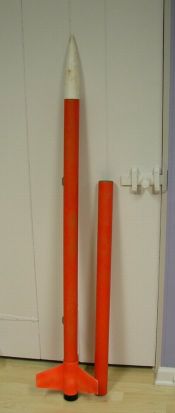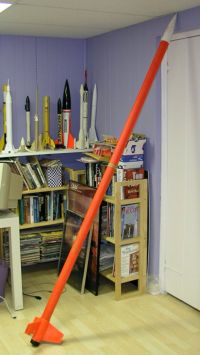Giant Leap Rocketry Firestorm-54
Giant Leap Rocketry - Firestorm-54 {Kit}
Contributed by Scott Pearson
| Construction Rating: | starstarstarstarstar_border |
| Flight Rating: | starstarstarstarstar_border |
| Overall Rating: | starstarstarstarstar_border |
| Diameter: | 2.27 inches |
| Length: | 74.50 inches |
| Manufacturer: | Giant Leap Rocketry  |
 Brief:
Brief:
Minimum diameter 54 mm kit. This kit is advertised as a HPR "Almost Ready to Fly" kit. It can be used for either L1 or L2 flights and it is capable of breaking mach with the right motor. It is single stage rocket without frills, however, frills can be added at cost as GL offer's a number of discounted offers to upgrade the kit. The upgrades include G10 fiberglass tubes, Kevlar shockcord and heat pads for chutes, and Slimline motor retention.
Construction:
I went for the basic Firestorm 54 and added the heat pads for the chutes and a Slimline 54mm motor retainer with 38mm Slimline adapter. I would have loved the G10 tubes but I decided against it because of the cost and my lack of liquid resources.
Everything came just as ordered: standard nose cone, phenolic body tube, Acme Zytec fin can, rail guides, decal, parachute shock cord, and an odd double tube retention point to mount the shock cord. Along with the kit, I received the requested upgrades of Slimline components and Kevlar® heat pads.
I added a few touches of my own to the kit: a 24 inch payload section, an electronics bay, and I changed out the Acme lugs for Acme rail guides.
The instructions were two pages and very minimalist, but there is not much to do on this rocket so I guess it's no big deal. I only consulted the instructions to find out about the shock cord mounting point and any tips that they had for installation.
 The mounting point is a double tube with a piece of all thread in it to attach the shock cord. I was concerned about the all thread cutting the shock cord so I wrapped it first with tape. I then had to figure out a way to get epoxy down this skinny tube without mucking the whole thing up. I finally used two long soft drink straws and forced the epoxy down the straw to the correct location and pushed down the shock cord mount. This was the biggest challenge of the whole build.
The mounting point is a double tube with a piece of all thread in it to attach the shock cord. I was concerned about the all thread cutting the shock cord so I wrapped it first with tape. I then had to figure out a way to get epoxy down this skinny tube without mucking the whole thing up. I finally used two long soft drink straws and forced the epoxy down the straw to the correct location and pushed down the shock cord mount. This was the biggest challenge of the whole build.
The fins are the easiest fins in the world--just some light sanding and epoxy them on. I used JB Weld for its heat resistant properties. The Slimline motor retainer was also attached with JB Weld.
I used a coupler section, some basswood, and all thread to create a electronics bay. I then drilled holes in the payload bay and used machine screws to attach the nose cone to the payload bay.
Finishing:
Since I wanted to fly it the next day I took it out back to paint. I sprayed it with fluorescent orange paint and went to bed. Start to finish it took me around 3-4 hours for the entire build. A decal comes with the kit, but I would not buy the kit because of it.
Construction Rating: 4 out of 5
Flight:
I planned on flying it the following day but the weather did not cooperate. It was a cold and blustery day with winds blowing 10-15 mph and gusting. I decided against flying that day.
A month later, the weather was a perfect 80 degrees and light winds. I put it up on a Pro38 I285 and dual deployment using a streamer at apogee and parachute at 500 feet. Predicted altitude was just over 4000 feet.
For some reason it took off at a slight angle as it roared off the pad. This put it way down wind. The streamer deployed and apogee and I lost it in the sun. Lucky for me another club member watched it and helped me located it in the field.
Recovery:
I may have setup the main deployment wrong as the charge went off but the chute did not inflate and it hit a bit hard. Luckily, the only damage was the payload bay, which was the easiest part to replace on the whole rocket. I stopped by Giant Leap on the way to the car (they were onsite at the launch) and bought a new piece of tube so I can fly it again next month.
Flight Rating: 4 out of 5
Summary:
The Firestorm 54 is a nice kit even though there is not much to it. You could piece it together on your own but Giant Leap has discounted the prices of the components when purchased in kit form.
This bird can fly. I recommend either tracking devices or very loud beepers as this one can get lost real easy.
The decal and instructions are lacking and could be much better.
The fin can is very strong, but not indestructible. I would not drive over it but it should take many hard landings and come back for more.
The parts are high quality and you are offered plenty of options to upgrade at discounted prices to higher quality parts.
The Slimline motor retention worked like advertised. No worries about kicking the motor with this device.
Giant Leap is good at shipping on time and a pleasure to deal with as a vendor.
Overall Rating: 4 out of 5
Other Reviews
- Giant Leap Rocketry Firestorm-54 By Owen DeLong
Photo courtesy of Giant Leap Rocketry This is a single-stage super-sonic capable dirt-simple HPR rocket. A great HPR certification kit for L1 and L2. The kit comes with 1 body tube (phenolic or optional fiberglass extra $$), a 3-fin Acme Fin-can (very solid and easy to install), and is minimum diameter so there's no need for centering rings. The body tube is the motor ...
 |
 |
Flights
Sponsored Ads
 |
 |











